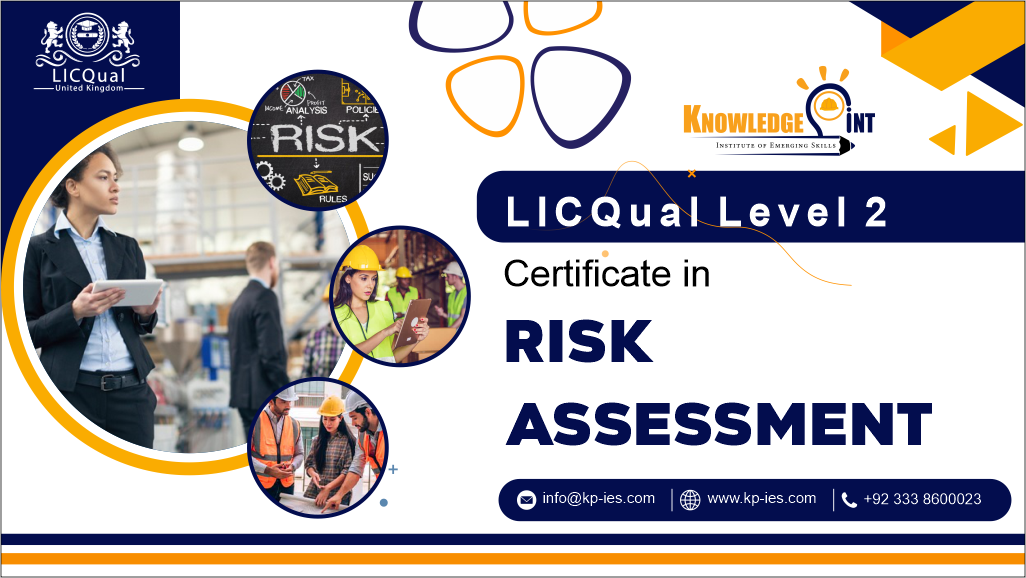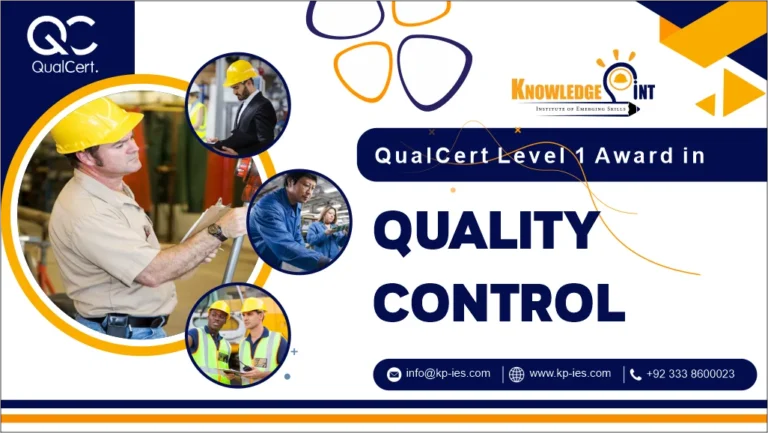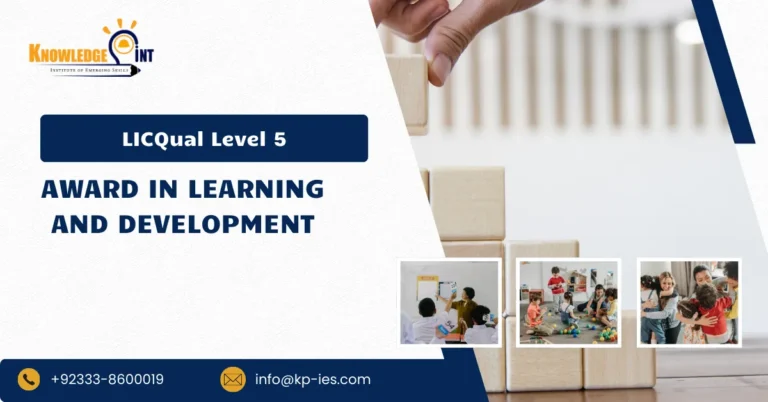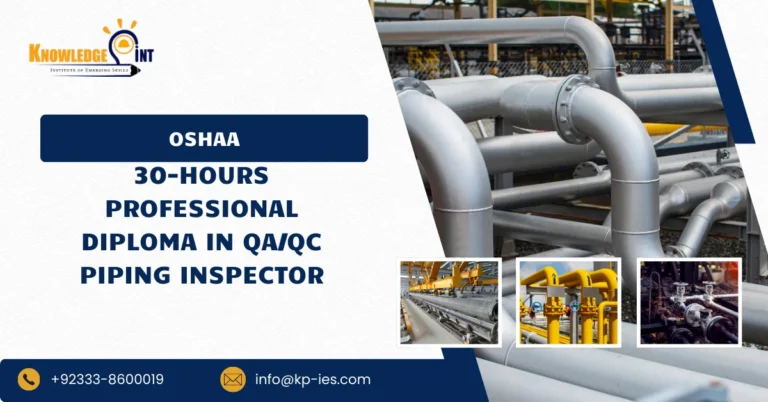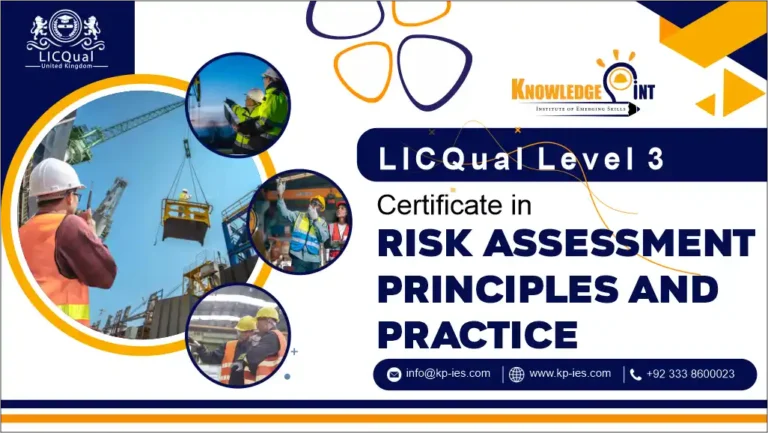In today’s ever-evolving work environments, the ability to identify, assess, and manage risks is crucial. For individuals starting their careers or looking to enhance their knowledge in health and safety, the LicQual Level 2 Certificate in Risk Assessment offers a perfect opportunity. This certificate equips you with the essential skills needed to ensure safer workplaces, making you an invaluable asset to any organization.
The LicQual Level 2 Certificate in Risk Assessment is a foundational qualification designed to introduce you to the principles and practices of risk assessment. This course is ideal for those who have little or no prior experience in risk management but are eager to develop their competencies in this vital area. The program covers fundamental concepts and provides practical skills that you can immediately apply in your workplace.
The LicQual Level 2 Certificate in Risk Assessment is an excellent starting point for anyone looking to develop essential skills in risk management. This qualification not only enhances your understanding of risk assessment principles but also provides practical tools to improve workplace safety. Whether you’re beginning your career or seeking to expand your knowledge, this award can help you achieve your professional goals and make a meaningful impact in your organization.
Take the first step towards mastering risk assessment and enhancing your career prospects. Enroll in the LicQual Level 2 Certificate in Risk Assessment today and start building a safer, more secure future in your workplace. Your journey to effective risk management begins here.
Course Overview
The LicQual Level 2 Certificate in Risk Assessment consists of 5 mandatory units which are as follows.
The learning outcomes of LicQual Level 2 Certificate in Risk Assessment include:
Introduction to Risk Assessment
- Understand the Concept of Risk Assessment: Gain a clear understanding of what risk assessment is and its importance in maintaining a safe workplace.
- Historical Context: Learn about the evolution of risk assessment practices and their significance in modern workplace safety.
- Fundamental Principles: Understand the basic principles of risk assessment, including the identification, analysis, and management of risks.
- Types of Risks: Identify and differentiate between various types of risks such as physical, chemical, biological, ergonomic, and psychosocial risks.
- Role of Risk Assessment in Safety Management: Recognize the role of risk assessment within the broader context of workplace safety and health management systems.
Legal and Regulatory Framework
- Legislation and Standards: Understand the key legislation and standards governing risk assessment and workplace safety in your region.
- Compliance Requirements: Learn about the compliance requirements for organizations with respect to risk assessment and safety management.
- Legal Responsibilities: Identify the legal responsibilities of employers, employees, and safety professionals in conducting and maintaining risk assessments.
- Penalties for Non-Compliance: Understand the potential legal and financial consequences of failing to conduct adequate risk assessments.
- Updates and Revisions: Stay informed about changes in legislation and standards, ensuring ongoing compliance with legal requirements.
Hazard Identification and Risk Analysis
- Hazard Identification Techniques: Learn various techniques for identifying hazards in the workplace, such as checklists, inspections, and employee consultations.
- Risk Analysis Methods: Understand different methods for analyzing risks, including qualitative and quantitative approaches.
- Assessing Likelihood and Impact: Develop skills to assess the likelihood and potential impact of identified hazards.
- Prioritizing Hazards: Learn to prioritize hazards based on their risk levels, focusing on those that pose the greatest threat to health and safety.
- Documentation: Gain proficiency in accurately documenting identified hazards and their associated risks for further assessment.
Risk Evaluation and Control Measures
- Risk Evaluation Criteria: Understand the criteria used to evaluate risks, including severity, probability, and exposure.
- Hierarchy of Controls: Learn about the hierarchy of control measures, from elimination and substitution to engineering controls, administrative controls, and personal protective equipment (PPE).
- Selecting Appropriate Controls: Develop the ability to select the most appropriate control measures for identified risks, considering their effectiveness and feasibility.
- Implementing Control Measures: Gain practical skills in implementing control measures to mitigate risks in the workplace.
- Monitoring and Review: Understand the importance of monitoring and reviewing control measures to ensure their continued effectiveness and make adjustments as necessary.
Risk Assessment Report and Communication
- Effective Reporting: Learn how to create clear and comprehensive risk assessment reports that effectively communicate findings to stakeholders.
- Key Components of a Risk Assessment Report: Understand the key components that should be included in a risk assessment report, such as hazard identification, risk evaluation, control measures, and recommendations.
- Communication Techniques: Develop effective communication techniques to convey risk assessment findings and recommendations to various stakeholders, including management, employees, and regulatory bodies.
- Engaging Stakeholders: Recognize the importance of engaging stakeholders in the risk assessment process to ensure understanding and support for safety measures.
- Maintaining Records: Learn the importance of maintaining accurate and up-to-date records of risk assessments and related communications to ensure compliance and facilitate future reviews.
These learning outcomes provide a comprehensive framework for understanding and conducting effective risk assessments, ensuring a safer and more compliant workplace environment.
Course Benefits of the LicQual Level 2 Certificate in Risk Assessment :
1. Specialized Expertise
- Auditing Proficiency: Gain specialized knowledge and skills in auditing energy management systems according to the ISO 50001:2018 standard.
- Industry Recognition: Earn a globally recognized qualification that demonstrates your proficiency as an energy management systems auditor.
2. Career Advancement
- Expanded Career Opportunities: Qualify for roles such as Lead Energy Auditor, Energy Management Consultant, or Compliance Officer.
- Higher Earning Potential: Enhance your value to employers and increase your earning potential with specialized expertise in energy management auditing.
3. Industry-Relevant Skills
- Practical Application: Acquire practical skills and techniques for planning, conducting, and documenting energy management system audits.
- Effective Communication: Develop communication skills to interact with auditees, audit teams, and stakeholders effectively.
4. Contribution to Sustainability
- Promotion of Energy Efficiency: Play a key role in promoting energy efficiency and reducing environmental impact within organizations.
- Support for Sustainable Practices: Assist organizations in implementing and maintaining energy management systems that support sustainability goals.
5. Quality Assurance
- Compliance Assurance: Help organizations achieve compliance with ISO 50001:2018 requirements and other relevant regulatory standards.
- Risk Mitigation: Identify areas of non-conformance and provide recommendations for corrective actions to mitigate risks.
6. Continuous Professional Development
- Lifelong Learning: Engage in continuous professional development by staying updated with the latest developments and trends in energy management auditing.
- Networking Opportunities: Connect with industry professionals, auditors, and experts, expanding your professional network and opportunities.
7. Organizational Benefits
- Improved Performance: Contribute to the improvement of organizational energy performance through effective auditing and recommendations for continuous improvement.
- Enhanced Reputation: Help organizations build a positive reputation for their commitment to energy management and sustainability practices.
8. Personal Growth
- Leadership Development: Develop leadership skills to effectively manage audit teams, delegate tasks, and ensure audit objectives are met.
- Confidence Boost: Gain confidence in your abilities as an energy management systems auditor through practical training and hands-on experience.
The LicQual Level 2 Certificate in Risk Assessment serves as a foundational qualification for individuals involved in assessing and managing risks within various industries. As the landscape of risk management evolves and new challenges arise, the course must evolve to meet these demands effectively. Here are potential future advancements and enhancements for this essential certification:
1. Integration of Advanced Risk Assessment Techniques
- Risk Assessment Methodologies: Incorporating advanced risk assessment methodologies and tools, such as quantitative risk analysis techniques and probabilistic risk assessment (PRA). This allows for more accurate risk predictions and prioritization.
- Scenario-Based Learning: Introducing scenario-based learning modules that simulate complex risk scenarios to provide practical experience in risk identification, assessment, and mitigation strategies.
2. Technological Integration
- Digital Risk Assessment Tools: Leveraging digital platforms and software for risk assessment to streamline data collection, analysis, and reporting. This includes cloud-based solutions for real-time collaboration and data accessibility.
- Artificial Intelligence (AI): Integrating AI algorithms for predictive risk modeling and automated risk assessments. AI can analyze large datasets to identify patterns and potential risks, enhancing decision-making processes.
3. Specialized Risk Assessments
- Industry-Specific Modules: Developing specialized modules tailored to specific industries, such as healthcare, construction, finance, and environmental sectors. This ensures that risk assessment practices are relevant and contextualized to industry-specific hazards and regulations.
- Emerging Risks: Addressing emerging risks, such as cybersecurity threats, climate change impacts, and global health crises, and incorporating these into the curriculum to prepare risk assessors for future challenges.
4. Focus on Psychological and Behavioral Aspects
- Risk Perception and Communication: Including modules on risk perception, communication strategies, and stakeholder engagement. This enhances the ability of risk assessors to effectively communicate risks and foster risk-aware organizational cultures.
- Human Factors and Decision Making: Integrating principles of human factors engineering and behavioral psychology into risk assessment practices. This includes understanding how human behavior influences risk outcomes and decision-making processes.
5. Ethical and Legal Considerations
- Ethical Decision Making: Providing training on ethical considerations in risk assessment, including confidentiality, transparency, and conflicts of interest. This ensures that risk assessors adhere to ethical standards and guidelines.
- Legal Compliance: Updating content to reflect the latest legal and regulatory requirements related to risk assessment practices. This includes data protection laws, environmental regulations, and occupational health and safety standards.
6. Continuous Professional Development
- Advanced Certification Pathways: Offering advanced certification pathways or modules for individuals seeking deeper expertise in specific areas of risk assessment, such as enterprise risk management (ERM) or crisis management.
- Refresher Courses and Updates: Providing refresher courses and updates to ensure that certified risk assessors stay informed about evolving best practices, technologies, and regulatory changes in risk management.
7. Global Perspective and Cultural Competence
- International Standards: Integrating international risk management standards and frameworks, such as ISO 31000, to prepare risk assessors for global operations and compliance with diverse regulatory environments.
- Cross-Cultural Training: Including cross-cultural training to understand and respect risk management practices across different cultural contexts. This promotes effective collaboration and communication in multinational organizations.
8. Collaboration with Industry Partners
- Industry Partnerships: Collaborating with industry associations, organizations, and subject matter experts to co-develop curriculum content and case studies. This ensures that training materials are relevant, practical, and aligned with industry needs.
9. Practical Application and Case Studies
- Real-World Case Studies: Incorporating real-world case studies and examples of successful risk assessment practices across various industries. This provides practical insights and enhances problem-solving skills among participants.
- Hands-On Workshops: Offering hands-on workshops and exercises that allow participants to apply risk assessment techniques in simulated environments. This reinforces learning and builds confidence in applying theoretical knowledge to practical scenarios.
10. Evaluation and Continuous Improvement
- Participant Feedback: Implementing robust feedback mechanisms to gather input from participants and stakeholders on the effectiveness of the training program. This feedback is used to continuously improve course content, delivery methods, and overall learning experiences.
- Performance Metrics: Establishing performance metrics and benchmarks to measure the impact of the LicQual Level 2 Certificate in Risk Assessment on organizational risk management capabilities and outcomes.
The future progression of the LicQual Level 2 Certificate in Risk Assessment focuses on integrating advanced methodologies, leveraging technology, addressing emerging risks, enhancing psychological aspects, ensuring ethical and legal compliance, fostering global competence, and promoting continuous professional development. By evolving to meet industry demands and incorporating cutting-edge practices, this certification program will continue to equip risk assessors with the skills and knowledge needed to effectively identify, evaluate, and mitigate risks in diverse organizational settings.

